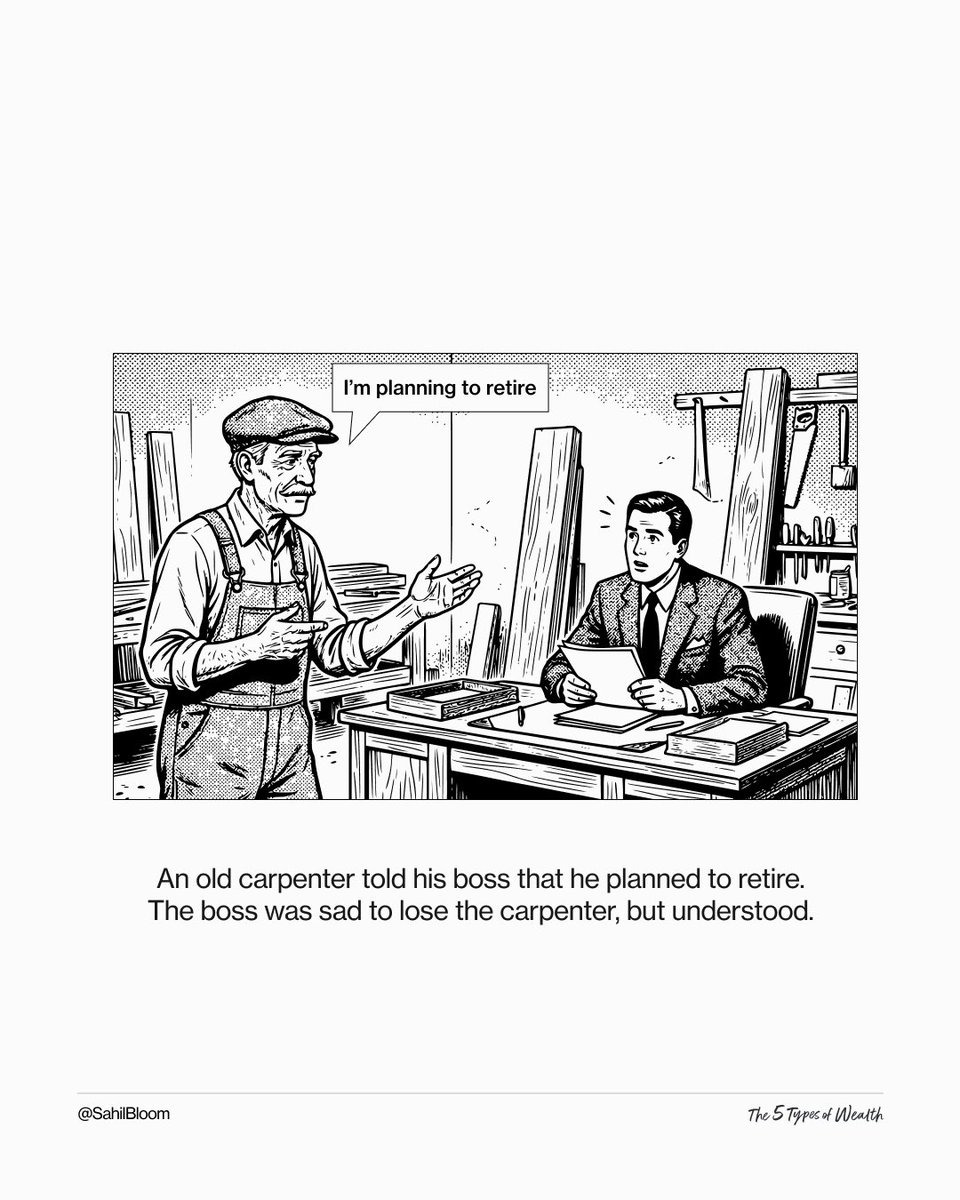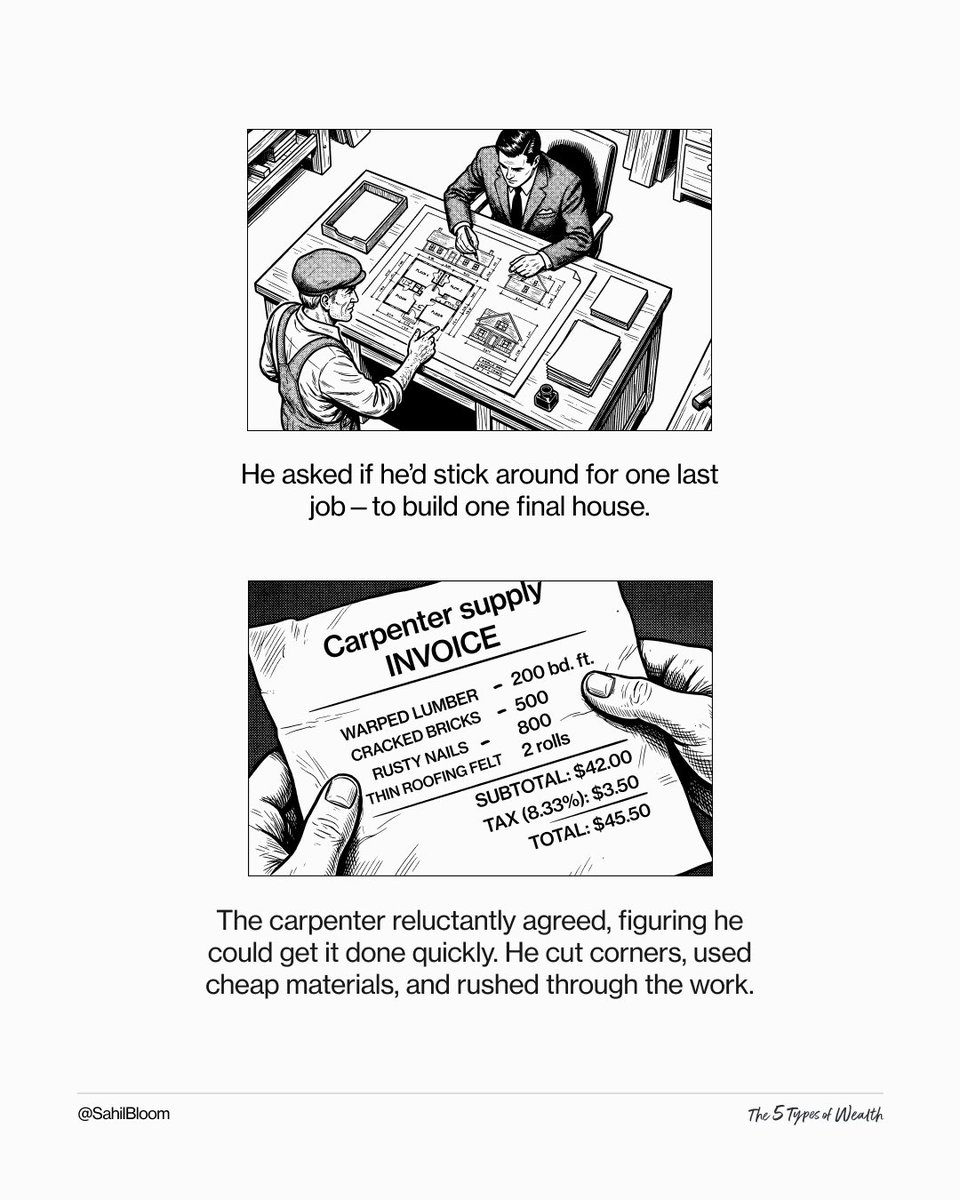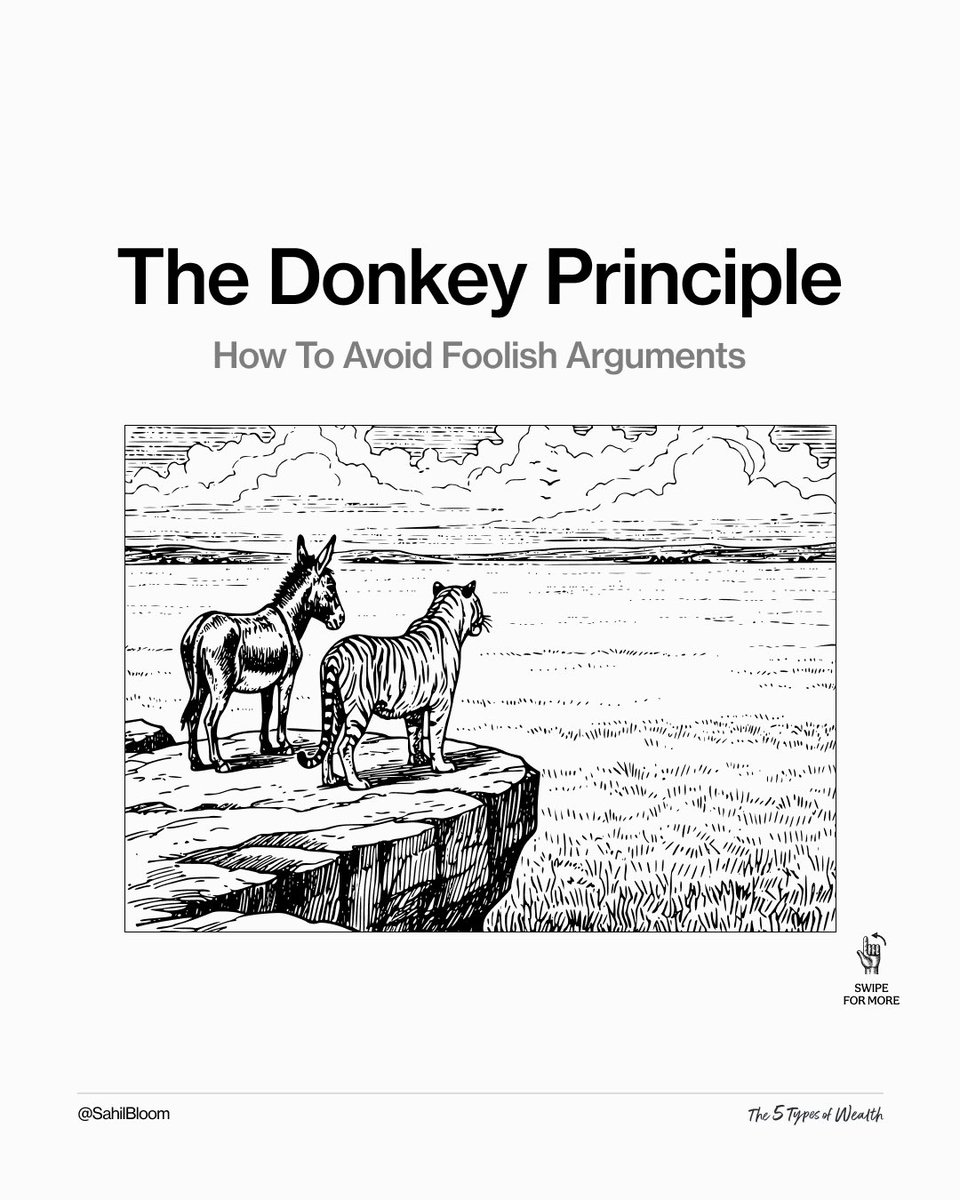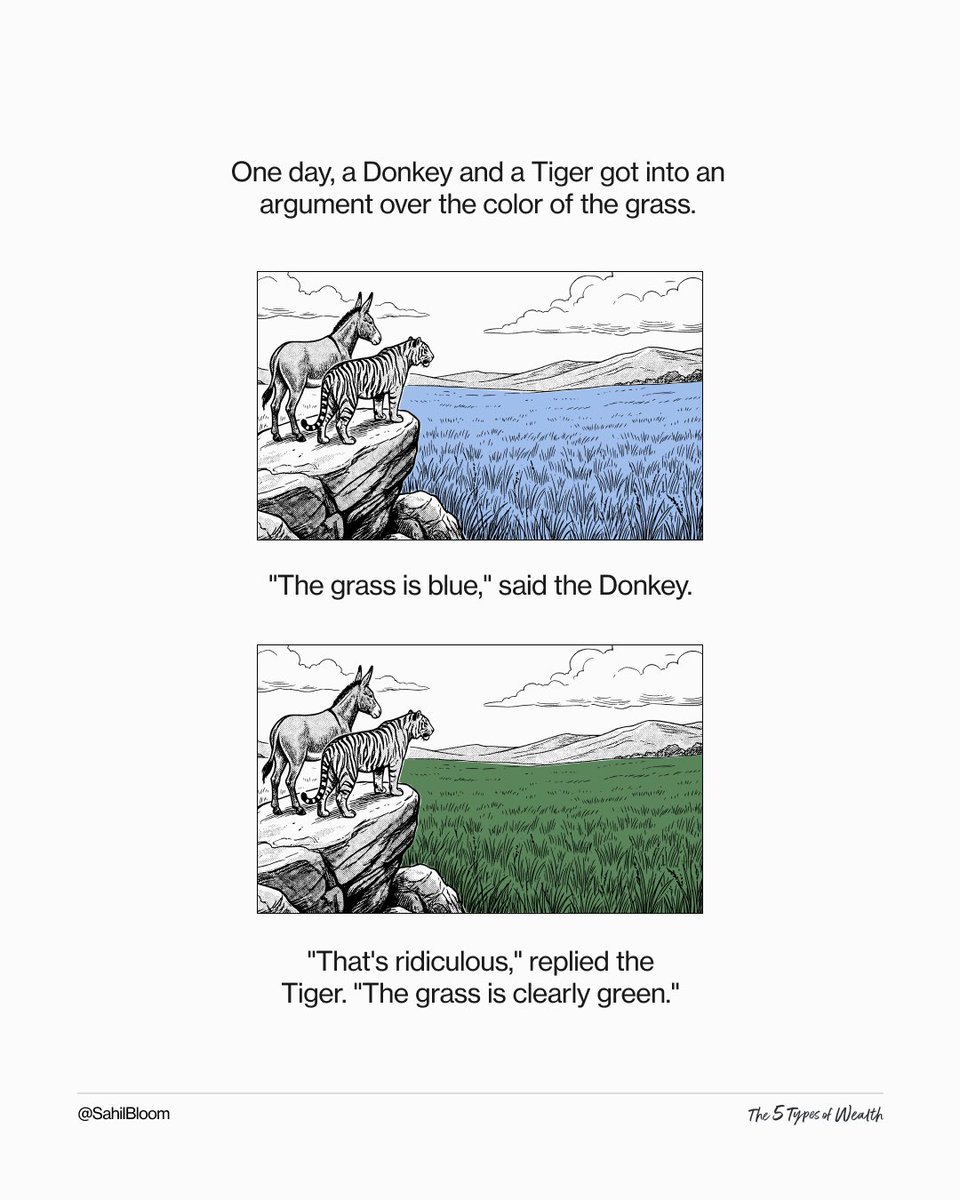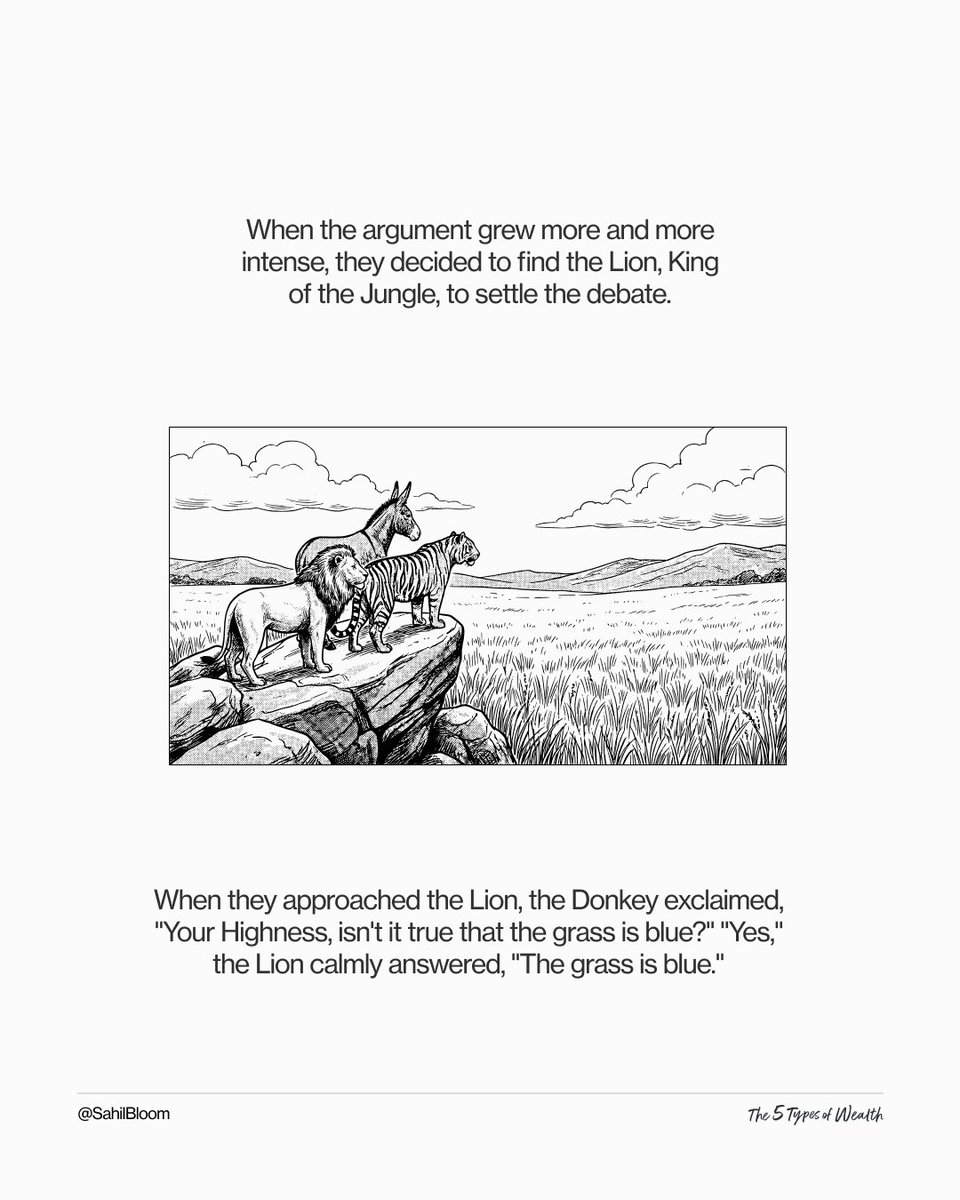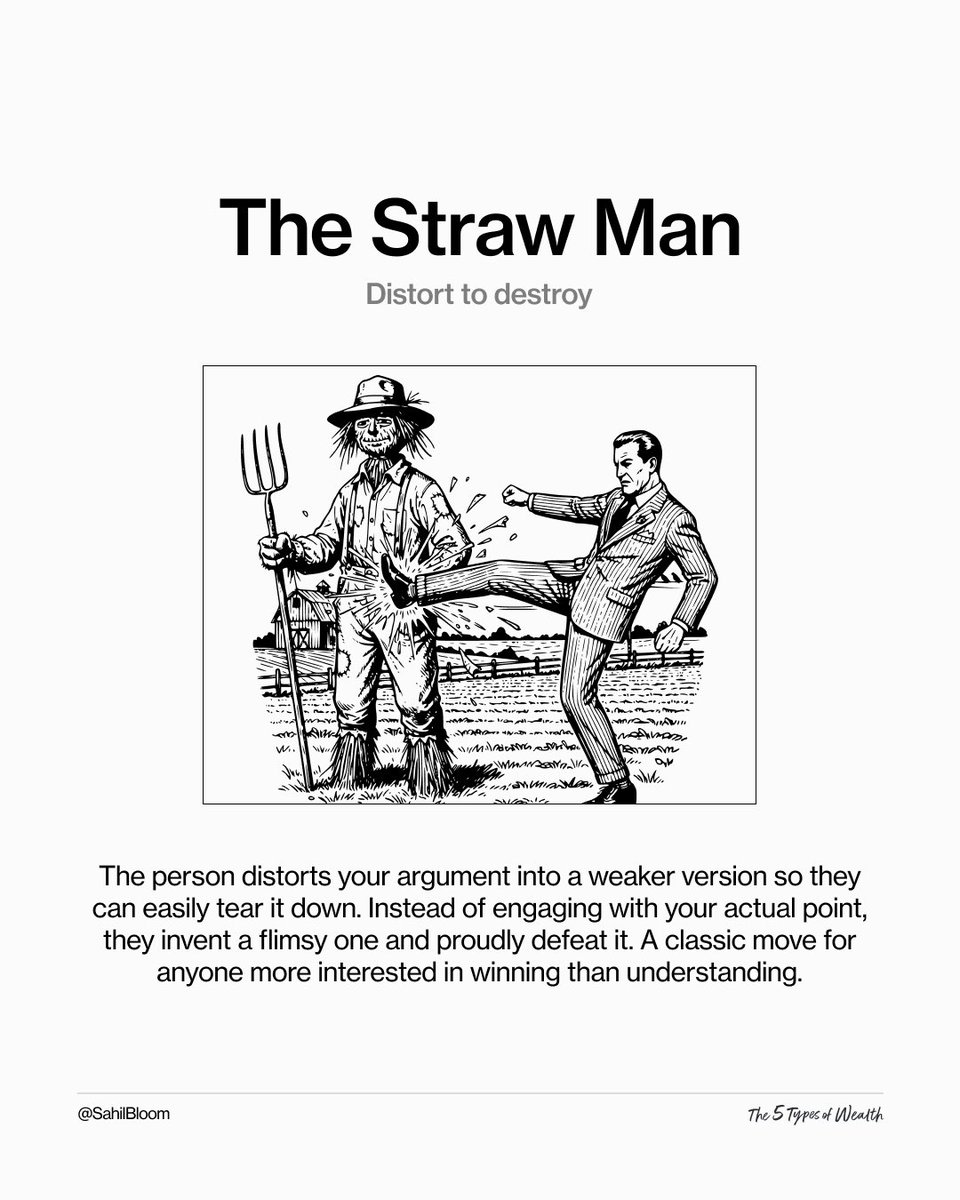How to Win (without talent or luck):
Operate in Your Zone of Genius
Your Zone of Genius is where your interests, passions and skills align.
Operating in your Zone of Genius means playing games you are uniquely well-suited to win.
Once you identify it, you can stop playing *their* games and start playing *yours*.
Your Zone of Genius is where your interests, passions and skills align.
Operating in your Zone of Genius means playing games you are uniquely well-suited to win.
Once you identify it, you can stop playing *their* games and start playing *yours*.
Adopt a Positive Sum Mentality
Want to get ahead in life? Start genuinely rooting for others to succeed.
When one of us wins, we all win—winning spreads.
If you adopt that mentality, you’ll become a magnet for the highest quality people.
Want to get ahead in life? Start genuinely rooting for others to succeed.
When one of us wins, we all win—winning spreads.
If you adopt that mentality, you’ll become a magnet for the highest quality people.
Speak Up
Closed mouths don’t get fed.
A little push goes a long way. Don't sit back and wait for good things to happen.
If you want something—and you’ve put in the work for it—ask for it.
Worst case: you’re told no and nothing has changed.
Best case: it’s yours.
Closed mouths don’t get fed.
A little push goes a long way. Don't sit back and wait for good things to happen.
If you want something—and you’ve put in the work for it—ask for it.
Worst case: you’re told no and nothing has changed.
Best case: it’s yours.
Play Long-Term Games
Life is the ultimate long game.
Those with low time preference play it more effectively—they happily delay gratification to allow compounding to work its magic.
In a world of people seeking instant gratification, this is a meaningful edge.
Life is the ultimate long game.
Those with low time preference play it more effectively—they happily delay gratification to allow compounding to work its magic.
In a world of people seeking instant gratification, this is a meaningful edge.
Have a High Tolerance for Failure
We fear failure, so most of us play it safe to avoid it.
But our greatest moments of growth often stem directly from our greatest failures.
Don't accept failure, but don't fear it either.
You will fail. Embrace it. Fail smart and fast.
We fear failure, so most of us play it safe to avoid it.
But our greatest moments of growth often stem directly from our greatest failures.
Don't accept failure, but don't fear it either.
You will fail. Embrace it. Fail smart and fast.
Follow Your Curiosity
Humans are born with astonishing curiosity. But somewhere along the way, we're told to stop asking questions.
Push back.
Learn to follow your curiosity—trust it.
For the curious mind, anything is possible. Fortune favors the curious.
Humans are born with astonishing curiosity. But somewhere along the way, we're told to stop asking questions.
Push back.
Learn to follow your curiosity—trust it.
For the curious mind, anything is possible. Fortune favors the curious.
Adopt a Process Orientation
Prioritize process, not outcomes.
When you prioritize process, you become flexible in where you are headed—you focus on the inputs and stop worrying about the outputs.
Just keep laying one brick at a time—forward progress is all that matters.
Prioritize process, not outcomes.
When you prioritize process, you become flexible in where you are headed—you focus on the inputs and stop worrying about the outputs.
Just keep laying one brick at a time—forward progress is all that matters.
Prioritize People
Everything in life comes down to people and relationships.
Networks compound as well as any financial investment.
Build an army of mentors, friends, and evangelists that is deep and wide.
Cultivate deep relationships, but also embrace the power of weak ties.
Everything in life comes down to people and relationships.
Networks compound as well as any financial investment.
Build an army of mentors, friends, and evangelists that is deep and wide.
Cultivate deep relationships, but also embrace the power of weak ties.
Work Like a Lion
Modern work culture is a remnant of the Industrial Age. It encourages long periods of steady, monotonous work unsuited for the Information Age.
If your goal is to do inspired, creative work, you have to work as a lion works.
Sprint when inspired. Rest. Repeat.
Modern work culture is a remnant of the Industrial Age. It encourages long periods of steady, monotonous work unsuited for the Information Age.
If your goal is to do inspired, creative work, you have to work as a lion works.
Sprint when inspired. Rest. Repeat.
Become Antifragile
In Greek mythology, the Hydra is a creature that has multiple heads. When 1 head is cut off, 2 grow back in its place.
Life is random and chaotic.
Don't be broken by the chaos—rather, adopt a mentality and build structure such that you will benefit from it.
In Greek mythology, the Hydra is a creature that has multiple heads. When 1 head is cut off, 2 grow back in its place.
Life is random and chaotic.
Don't be broken by the chaos—rather, adopt a mentality and build structure such that you will benefit from it.
Change Your Mind
Willingness to change one's mind is a rarity in today's society.
It's great to have a strong view, but always open your mind to counterarguments.
Stubborn objection to alternative perspectives stalls progress.
Strive for strong opinions, weakly held.
Willingness to change one's mind is a rarity in today's society.
It's great to have a strong view, but always open your mind to counterarguments.
Stubborn objection to alternative perspectives stalls progress.
Strive for strong opinions, weakly held.
Never Get Too Big to Do the Small
The leaders of the All Blacks rugby team famously stay late to sweep the shed after a match.
Why? Because small things become big things.
Whether you're in the mailroom or the corner office, never get too big to do the small things well.
The leaders of the All Blacks rugby team famously stay late to sweep the shed after a match.
Why? Because small things become big things.
Whether you're in the mailroom or the corner office, never get too big to do the small things well.
Learn Storytelling
Storytelling is a foundational skill—but it's one we don’t learn in the traditional education system.
It's no coincidence that the highest performers are the strongest storytellers.
High-leverage storytelling is a supercharger for all human endeavors.
Storytelling is a foundational skill—but it's one we don’t learn in the traditional education system.
It's no coincidence that the highest performers are the strongest storytellers.
High-leverage storytelling is a supercharger for all human endeavors.
Develop a Bias for Motion
A body in motion tends to stay in motion—a body at rest tends to stay at rest.
When in doubt, just start moving.
A body in motion tends to stay in motion—a body at rest tends to stay at rest.
When in doubt, just start moving.
Become Relentlessly Consistent
Many people are able to produce bursts of energy—few are able to produce consistent, steady flows of energy.
The former is flashy, but the latter is relentless.
It's hard to bet against the person who just keeps showing up.
Many people are able to produce bursts of energy—few are able to produce consistent, steady flows of energy.
The former is flashy, but the latter is relentless.
It's hard to bet against the person who just keeps showing up.
Simplify Where Others Complicate
“The definition of genius is taking the complex and making it simple." — Einstein
Complexity and jargon are often used to mask a lack of deep understanding.
Learn to convey the complex in simple, digestible ways.
Find beauty in simplicity.
“The definition of genius is taking the complex and making it simple." — Einstein
Complexity and jargon are often used to mask a lack of deep understanding.
Learn to convey the complex in simple, digestible ways.
Find beauty in simplicity.
Be Comfortable with Discomfort
We are conditioned to avoid discomfort, so most of us do.
The problem?
Discomfort is a precursor to growth—it is an absolute necessity.
Steel your mind and body—accept and embrace discomfort. Those that do have the ultimate competitive edge.
We are conditioned to avoid discomfort, so most of us do.
The problem?
Discomfort is a precursor to growth—it is an absolute necessity.
Steel your mind and body—accept and embrace discomfort. Those that do have the ultimate competitive edge.
Have Strong Plans (Loosely Held)
It's important to have a plan.
But as Mike Tyson famously said, "Everyone has a plan until they get punched in the mouth."
Plans have to be dynamic (and punch-proof!).
You'll only go as far as your ability to absorb and pivot on the fly.
It's important to have a plan.
But as Mike Tyson famously said, "Everyone has a plan until they get punched in the mouth."
Plans have to be dynamic (and punch-proof!).
You'll only go as far as your ability to absorb and pivot on the fly.
Pay It Forward
No matter how far you go, realize that you didn’t make it on your own.
Pay it forward. Be a mentor. Be a champion for others.
Their growth should become a source of tremendous joy and pride.
No matter how far you go, realize that you didn’t make it on your own.
Pay it forward. Be a mentor. Be a champion for others.
Their growth should become a source of tremendous joy and pride.
Become a Polymath
A polymath is a person with wide-ranging, multi-disciplinary knowledge.
Lifelong learners tend to be polymaths—their curiosity naturally leads to knowledge accumulation in a variety of disciplines.
Learn both horizontally and vertically.
A polymath is a person with wide-ranging, multi-disciplinary knowledge.
Lifelong learners tend to be polymaths—their curiosity naturally leads to knowledge accumulation in a variety of disciplines.
Learn both horizontally and vertically.
Give More Than You Receive
Focus on what you can do for others, not what they can do for you.
Focus first on the amount of value you create—not the amount that you capture.
This mentality will lead to more success and growth, but also to more fulfillment and joy.
Focus on what you can do for others, not what they can do for you.
Focus first on the amount of value you create—not the amount that you capture.
This mentality will lead to more success and growth, but also to more fulfillment and joy.
Learn to Compartmentalize
The most successful people in the world share one trait in common: an almost supernatural ability to compartmentalize.
Create boundaries across your work and personal endeavors.
When you focus on one, close the others and really focus on it.
The most successful people in the world share one trait in common: an almost supernatural ability to compartmentalize.
Create boundaries across your work and personal endeavors.
When you focus on one, close the others and really focus on it.
Be Present
With the rise of technology—and the instant access to millions of people and things that it has provided—the ability to be truly present has become a rarity.
When you’re with someone—whether a business contact, friend, or partner—be WITH them.
Put the phone down.
With the rise of technology—and the instant access to millions of people and things that it has provided—the ability to be truly present has become a rarity.
When you’re with someone—whether a business contact, friend, or partner—be WITH them.
Put the phone down.
Well there you have it—How to Win (without talent or luck).
(h/t @naval for the inspiration)
I’ve been working on that one for a while, so I hope you enjoyed it. Follow me @SahilBloom for more.
I also go deeper in my newsletter. You should subscribe! sahilbloom.substack.com
(h/t @naval for the inspiration)
I’ve been working on that one for a while, so I hope you enjoyed it. Follow me @SahilBloom for more.
I also go deeper in my newsletter. You should subscribe! sahilbloom.substack.com
Newsletter—including audio and brilliant, simple visualizations—will hit inboxes on Wednesday.
Subscribe so you don’t miss it!
Subscribe so you don’t miss it!
• • •
Missing some Tweet in this thread? You can try to
force a refresh



